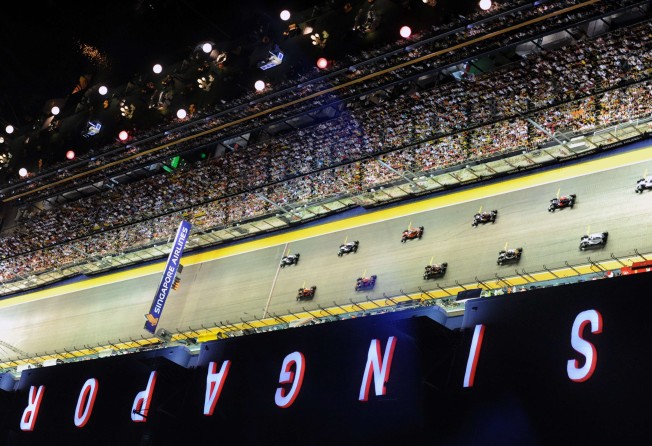
Will Singapore follow Malaysia in axing its Formula One grand prix – and why would it want to?
F1 could find itself without a race in Southeast Asia for first time in two decades after Malaysia cites costs in its decision to stop hosting races

The globetrotting sport of Formula One could find itself void of a Southeast Asian race for the first time in two decades as Singapore – one of two regional hosts – considers pulling out as it weighs up the fleeting international limelight that comes with hosting the event with the exorbitant cost of doing so.
Neighbouring Malaysia, an F1 host since 1998, on Monday left the sport’s future in the region on tenterhooks after a government minister confirmed it would stop hosting a grand prix after 2018, citing declining economic returns.
And observers say Southeast Asia’s only other F1 grand prix– Singapore’s floodlit night race in Marina Bay – could be the next to face the axe after next year’s edition.

F1 supremo Bernie Ecclestone stoked that belief after comments in a German magazine suggesting the city state had shown “no gratitude” for its rise in international stature since it started hosting the street race in 2008.
The 86-year-old later walked back his comments but the public griping over negotiations suggests the wealthy city state may not be willing to break the bank to secure races beyond 2017.
Organisers of Formula One’s 21 races – safe for Monaco – stump up a fee to the F1 group, which this year was taken over by US media conglomerate Liberty Media.

Analysts say this amount, which differs from country to country, has increased steadily as a large pool of cities vies to host races amid growing global viewership.
“If Singapore is indeed the crown jewel of F1, then the organisers will be asking why do we need to pay so much to host the race? Or why do we have to pay at all, when Monaco doesn’t pay?” said Song Seng Wun, a Singapore-based economist with CIMB Private Bank.
The Singapore race is estimated to cost around Sg$150 million (HK$816 million) each year, with the government stumping up 60 per cent of the amount. The race is organised by Singapore GP, a private company owned by local billionaire Ong Beng Seng.

“From Singapore’s standpoint, there is a realisation that the race is good to have, but not absolutely necessary,” Song said.
Organisers in September said average attendance fell to 73,000 this year, down from 87,000 in 2015 and 100,000 in its inaugural year in 2008.
First Singapore, now Malaysia – tourism chief confirms Sepang will leave Formula One after 2018 race
Matthew Marsh, a Hong Kong-based motor-racing TV commentator and former race driver, said the fall was “not significant” as attendance numbers usually drop and plateau after the initial years of a race, as the novelty factor for local attendees wears out.
“The Singapore promoters are not saying we don’t want the grand prix anymore. What they are saying is that we don’t want to continue having a grand prix that costs us so much money,” Marsh told This Week in Asia.

Marsh said a pull out by Singapore would hurt the city state as well as the sport.
“It would be a shame to lose the Singapore Grand Prix both for Singapore and for Formula One. It is the highlight of the social calendar and it draws people to Singapore who otherwise wouldn’t have gone there,” Marsh said.
“Anyone you talk to in Formula One has a very high opinion of Singapore because of the efficient and innovative ways in which they have made it not only a grand prix but a social event,” he added.
The 61-lap Singapore race brings the waterfront district to a near standstill as roads are closed off and dozens of rock concerts, gala dinners and other corporate events are held concurrently, making it the country’s biggest annual party.

In an interview late on Monday with Singapore’s Straits Times to clarify his comments, Ecclestone said negotiations “are ongoing and will be sorted out shortly…before the end of the year, I’m sure.”
“We want to extend long term. We’ll see what happens,” he said.
The demise of the 18-year-old race in Malaysia’s Sepang circuit, however, appears to be sealed.
Marsh said one of the factors for the termination was the country’s internal politics.
Malaysia’s Sepang circuit is seen as the brainchild of former prime minister Mahathir Mohamad – who is now a strident critic of the current premier Najib Razak, who is embroiled in corruption scandal.

One of Mahathir’s sons, Mokhzani, in October quit as chairman of the Sepang circuit after holding the position for 13 years.
“We need to recognise that there has been a change in the leadership and the political situation in Malaysia and it is not entirely surprising that the Formula One race would come under very heavy scrutiny,” Marsh said.
Song, the economist, said Malaysia was “looking at ways and means to put its fiscal house in order and spending on F1 is seen as not that beneficial and something that can be cut”.